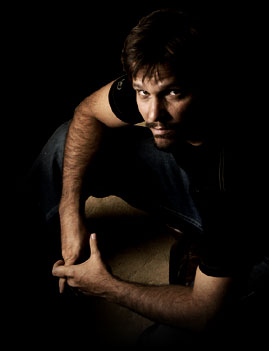Please Welcome...Ted Dekker
What an honor to have novelist Ted Dekker as our third interview guest at WhereTheMapEnds.com. As I've said elsewhere on this site, I feel that the work Ted has done with his fiction, in conjunction with Westbow's (now Thomas Nelson Fiction's) innovative marketing, have made great strides for all of us who care about Christian speculative fiction. And now the interview. WhereTheMapEnds: Catch us up with what's going on in your life. Ted Dekker: I’ve buried myself in movies, primarily House, the movie, and setting up a system that will allow us to make more movies in the future. I’ve just finished a novel titled Skin, due out in April, and am working on another due in a year or so. WhereTheMapEnds: What is your favorite speculative novel of all time (Christian or secular) and why is that your favorite? Ted Dekker: The Stand by Stephen King. It blew me away. WhereTheMapEnds: What made you want to write Christian speculative fiction? Ted Dekker: Well, I’m not sure what I write is Christian speculative fiction. I do write speculative fiction that is informed by my worldview, which, depending on how it’s defined, may be called "Christian." But in many parts of the world, that terms means something very different than what many of those reading this interview think it means. In Hollywood, for example, Christian stories are mistaken as stories about rightwing nuts who hate homosexuals or something similar. This isn’t me or my stories and certainly wouldn’t be the Christ I follow who advocated love, not hate. We have to be careful to use the language that is meaningful to the society we are writing for. Short answer, I never wanted to write Christian speculative fiction. WhereTheMapEnds: How was your first idea for a Christian speculative novel received (by anyone: spouse, friends, parents, agent, publisher, readers, reviewers, etc.)? Ted Dekker: It was seen by publishers as far too non-Christian. When it was eventually published (Black) it won all kinds of awards by that same community. Odd. WhereTheMapEnds: How would you characterize the current state of Christian speculative fiction writing and/or publishing? Ted Dekker: We are in the midst of a sweeping reform in which writers who write from our worldview are gaining mainstream acceptance. The Market is slowly but surely realizing that people of faith can write more than Christianized romances. To the extent that Christian bookstores open their arms to a broader spectrum of storytelling, including different kinds of speculative fiction, that market will continue to expand. If they don’t, the general market will step in to fill what is clearly still a void. Speculative fiction is a huge part of general market fiction. WhereTheMapEnds: What have you seen that encourages you about Christian speculative writing and/or publishing? Ted Dekker: A handful of publishers are now aggressively expanding the number of these titles they offer. The market is there. . WhereTheMapEnds: What have you seen that discourages or frustrates you about Christian speculative fiction writing and/or publishing? Ted Dekker: Christian bookstores are sometimes afraid to give readers honest choices for fear of offending a few. A comic book of mine was recently pulled due to violent content. I showed a bad dude being clocked. He bled. I showed the blood. I guess some don’t like seeing blood in Christian bookstores. Turn the Bible into a graphic novel and I think it would be rejected by most Christian bookstores. We drink the blood of Christ once a month, but refuse to look at it on the page. Odd. It’s one reason why the world scoffs at us, for good reason in this case. Clearly we need a new set of standards besides the one an old guard once favored. We need standards that allow for a culturally relevant incarnation of truth. WhereTheMapEnds: What do you think Christian speculative fiction writing and/or publishing will look like in three years? Five years? Ten years? Ted Dekker: Publishers will undoubtedly continue to expand their offerings of speculative genres, which push current boundaries. The only question is what Christian bookstores will do with that content. If they cater to the older market, then other major retailers like Wal-Mart will snag the emerging market, leaving Christian bookstores in the lurch. This all within five years at the outside. Either way it’s good news for the writers of speculative fiction. The appetite for this kind of story is significant. WhereTheMapEnds: What advice would you give to someone who aspires to write and publish Christian speculative fiction? Ted Dekker: When I first wrote Thr3e I was told it would never be accepted by the CBA market. One year later it won a Christy Award and the Gold Medallion. I say write what you love and others will love what you write. Flood the market with new tales of speculative fiction. Stretch our minds and push the boundaries. I'll do the same. WhereTheMapEnds: What's the best part about writing and publishing Christian speculative fiction? Ted Dekker: Again, I don’t quite identify with the word Christian in this question, but I would say writing is the best part of speculative fiction. To go where no writer has gone before is an intoxicating ride. I was born for it. So were we all, either as writers or readers.. WhereTheMapEnds: What writing project(s) are you working on now? Ted Dekker: Dead Dead. That's All for This TimeWhat a wonderful interview! Thanks again to Mr. Dekker. Be sure to visit him at his home on the Web: www.teddekker.com. Click here to return to the interview archive main page.
|

